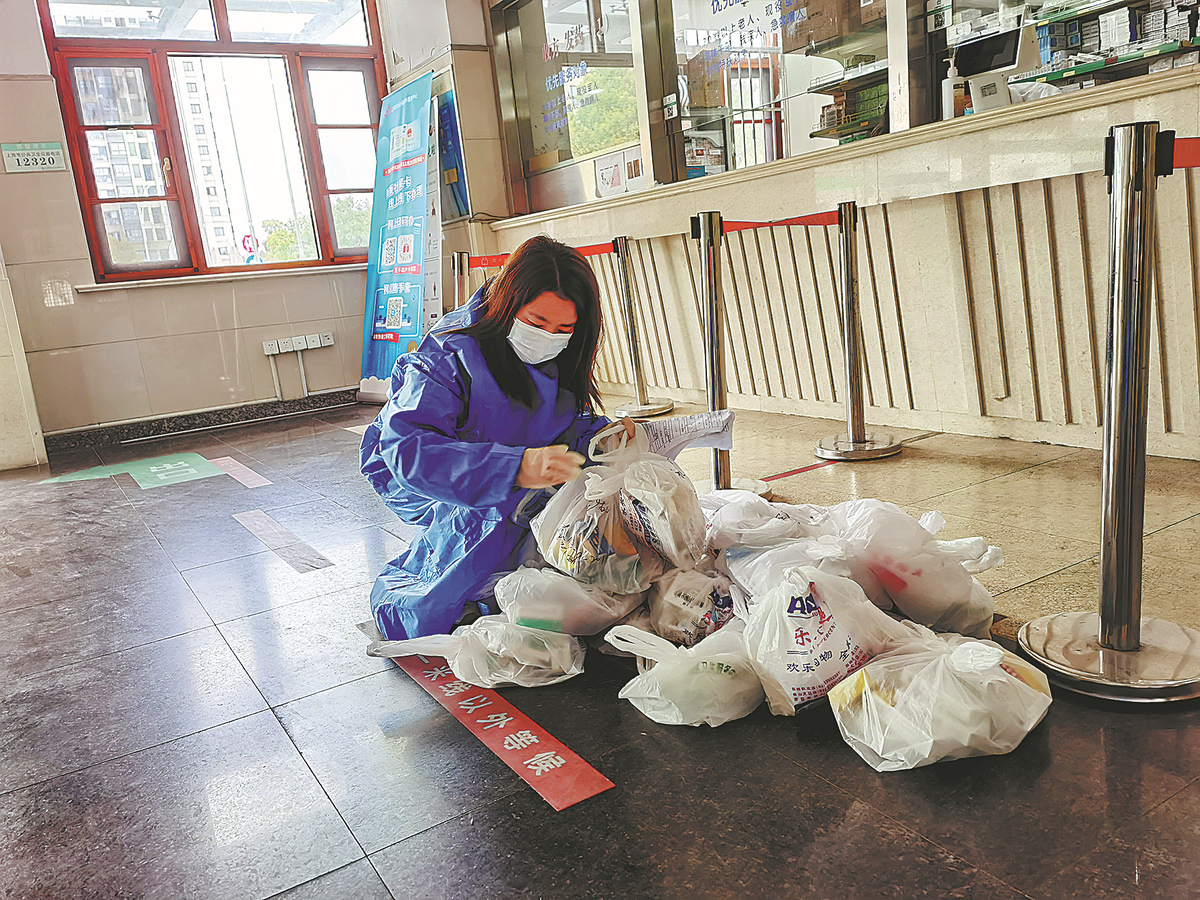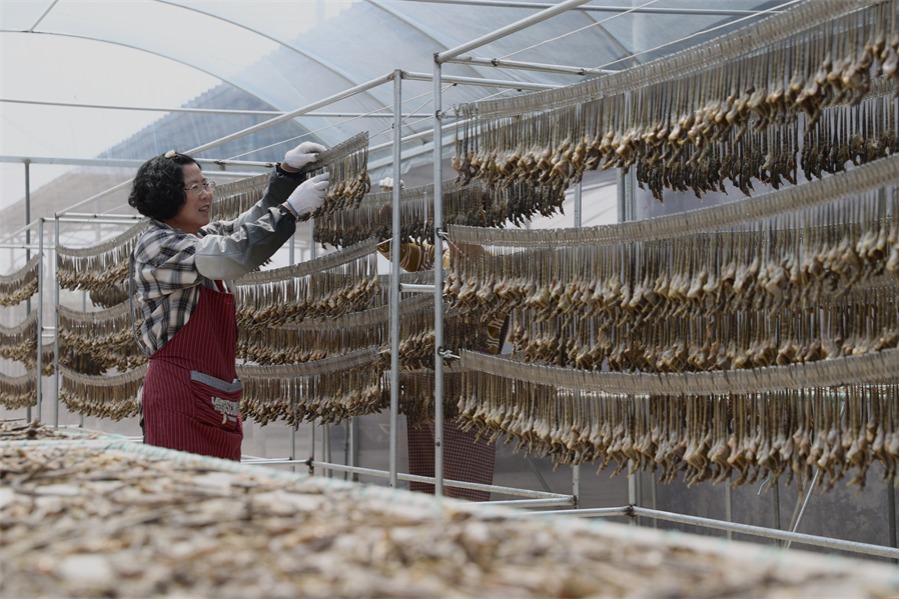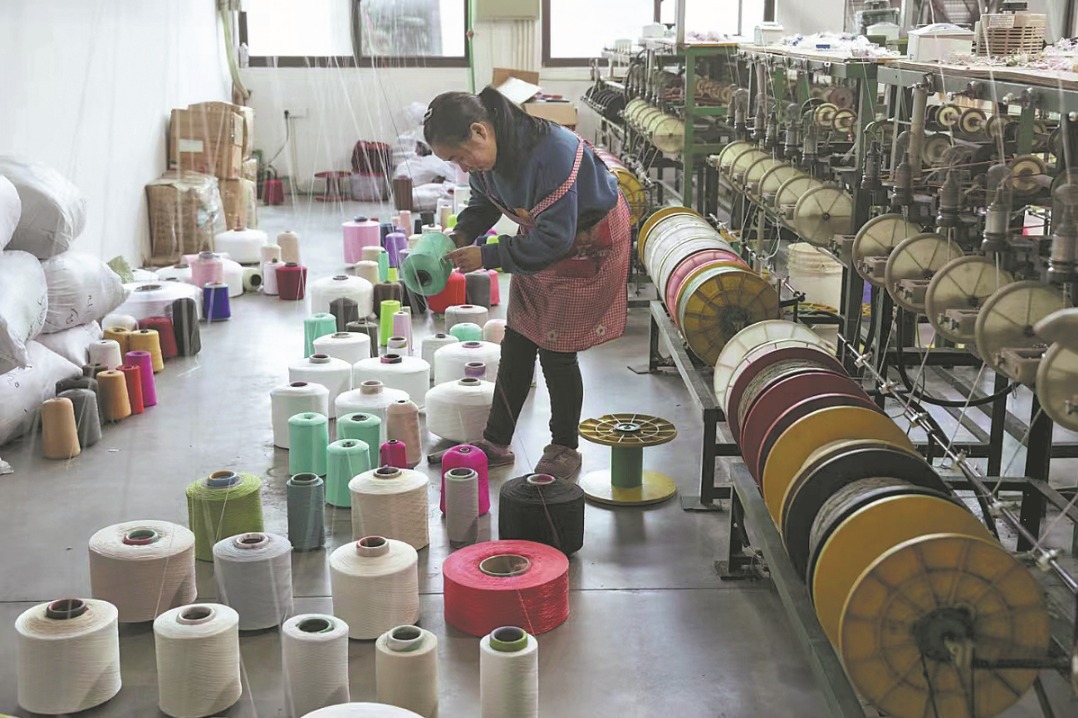Communities and pharmacies step up efforts to meet increased demand


Nearly one month into a citywide lockdown, additional human resources are being mobilized at communities and pharmacies in Shanghai to meet demand for medication among residents.
In Yongfeng subdistrict, Songjiang district, a group of 30 community volunteers has been helping people buy medicine since April 1, when restrictions on outdoor activities were introduced across the city to prevent the virus spreading, with only essential services allowed to remain open.
From 7 am to 10 pm every day, team member Zhang Xiaowen manages medication lists collected from residents in the subdistrict, before going to hospitals to collect their orders.
Despite the heavy workload involved in keeping track of dozens of medications each day, Zhang works as carefully as she can to ensure accuracy.
"Verifying the names and manufacturers of each medication is vital, because many of them are complex and similar," Zhang said. "We also check when we can collect drugs from each hospital, and work out the best route to go from one place to another.
"To enhance efficiency, different teams are in charge of tasks at community-, district- and city-level hospitals."
To date, medicine delivery services have been provided for more than 6,000 residents, with an average of 250 orders placed each day.
Voluntary assistance has been a pivotal part of the efforts made by the city to ensure that the public's medical needs are met during the lockdown, and also in easing the burden of deliveries normally shouldered by logistics companies.
Hospitals in the city have set up special windows to help community volunteers collect medication.
For example, after such a window was established on April 22 by Children's Hospital of Fudan University, volunteers now register on a self-service machine at just one outpatient department, instead of with different departments. They can also collect all the medication at the same time.
Shen Guomei, director of the hospital's outpatient management office, said, "Pharmacists at the window record patients' details and contact them later to check the delivery status of their medication and inform them of safety precautions."
In addition to community volunteers, pharmacies have adapted their front-line services to meet unprecedented demand for home deliveries during the lockdown.
In Xuhui district, residents use a WeChat program, launched by the district's administration of market regulation in late March, to locate pharmacies near their home, call in advance to check stock levels, and inquire about delivery services.
The program is based on a smart pharmacy supervision system established by the administration in 2019 in collaboration with more than 70 pharmacies in the district.
Zhang Hao, manager of the Shanghai Fumei Pharmacy branch in Xuhui, said: "It was no surprise that customer numbers plunged at our bricks-and-mortar outlets that remained open after the lockdown was imposed. However, this has given us the time to deliver medication to neighborhoods within 3 kilometers of our store."
He added that medication purchases are limited to a maximum of one month's supply at the prescribed dosage.
"We have to be there for our patients and communities. As more logistics companies have resumed operations recently, couriers have also been helpful in delivery services," Zhang added.
Moreover, on April 13, the administration of market regulation launched medication deliveries through the WeChat program for residents booking online consultations and receiving electronic prescriptions at designated facilities, including Zhongshan Hospital, Longhua Hospital and Central Hospital in Xuhui district.
The deliveries are operated in cooperation with Yiyao Pharmacy, a pharmaceutical e-commerce platform affiliated with Shanghai Pharmaceutical Group.
Online cooperation between hospitals and pharmacies has also helped with deliveries of medication in Yangpu district. To date, eight designated pharmacies in the district have assisted more than 80 hospitals in delivering medication 2,535 times.
Zhang Ling, director of the pharmacy supervision department at the Yangpu Administration of Market Regulation, said pharmacists are responsible for storing and dispensing products prescribed online by hospitals, before the volunteers take them to residents.
"As of April 20, up to 400 online medical orders were being placed daily in each subdistrict in Yangpu, so pharmacists with medical expertise are fundamental to guaranteeing the delivery efficiency and safety of medicine," Zhang said.
Pharmacists also have to take additional training for drug deliveries and communication to prevent any mistakes being made, Zhang added.
- Events highlight women's empowerment through technology and innovation
- Cultural industries fair: Dive into the fusion of culture and tech
- Magic of Dunhuang VR captivates kids at Shenzhen fair
- Cultural activities during China Int'l Cultural Industries Fair attract young visitors
- Heilongjiang University promotes cultural diversity at International Cultural Festival
- Experts work on COVID-19 antibody treatments for young children




































